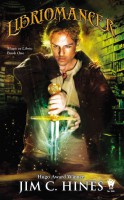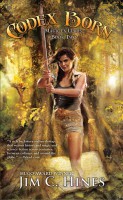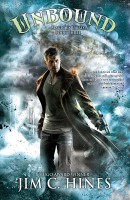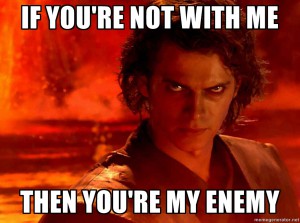Best American Poetry 2015 has become, in the words of editor Sherman Alexie, a “damn mess.”
Of the seventy-five poets included in BAP this year, the one at the heart of the mess is Michael Derrick Hudson, who submitted his poem “The Bees, the Flowers, Jesus, Ancient Tigers, Poseidon, Adam and Eve” using the pseudonym Yi-Fen Chou. The poem had been rejected 40 times when Hudson submitted under his own name. It was rejected nine more times when submitted by “Chou,” before being accepted by Prairie Schooner, and later by Alexie for Best American Poetry.
Alexie’s post about the controversy is here.
This opens up a lot of questions and anger that will probably sound familiar to folks who’ve been following debates about the Hugo awards and the SF/F genre in general.
1. Quality vs. Identity. First and foremost is whether this shows people are choosing work based not on quality, but on race and other aspects of identity. Is it really about quotas and checklists, as certain people have argued?
Two of Alexie’s statements are worth highlighting here.
- “I paid more initial attention to his poem because of my perception and misperception of the poet’s identity. Bluntly stated, I was more amenable to the poem because I thought the author was Chinese American.”
- “In the end, I chose each poem in the anthology because I love it.”
The question or quality vs. identity isn’t a mutually exclusive one. This goes back to the false idea that calls for diversity are somehow inherently incompatible with a focus on quality. My reading of what Alexie says in his statement is that Hudson’s pseudonym helped him in the first round of reading, as Alexie was sorting through several thousand poems. But in the end, Alexie made his final decisions based on the quality of the work, selecting 75 poems he loved.
2. Okay, fine, whatever. But would Hudson have gotten in under his own name? This is what a lot of people really want to argue, and I don’t think it’s a question anyone can answer. Hudson’s poem was good enough to be included in BAP. But is there another “good enough” poem that got knocked out of contention because of Hudson’s pseudonym and Alexie’s nepotism?
“…in putting Yi-Fen Chou in the ‘maybe’ and ‘yes’ piles, I did something amorphous. I helped a total stranger because of racial nepotism. I was practicing a form of literary justice that can look like injustice from a different angle. And vice versa.”
Hudson said he deliberately used a Chinese pseudonym to increase his chances of getting published. His poem was rejected 40 times under his name, but only 9 times under “Yi-Fen Chou,” which proves … very little, really. Maybe one of those 40 markets would have accepted the poem under his pseudonym. Maybe that 50th market would have rejected Michael Hudson. But given the way writing and submitting work, we’d need a much larger sample size to reach any conclusions.
We know Alexie paid more attention to and was more amenable to the poem because of that pseudonym. We can’t know whether that was a deciding factor in the poem’s inclusion, though it’s certainly possible.
3. Isn’t Hudson doing the same thing Alice Sheldon did when she wrote as James Tiptree Jr?
Sheldon adopted a male pseudonym in a field with an ongoing, systemic bias against women.
Before I go further, I should note that I’m not an expert on the American poetry market, or on poetry in general. But in order to equate Hudson and Sheldon here, you’d have to demonstrate that an equivalent ongoing, systemic bias against white men exists in the field of poetry. I suspect Hudson believes that, based on his statements. Alexie’s comments suggest otherwise:
“I carefully studied each year’s edition of BAP and was highly critical of the aesthetic range (Okay, there had to be more than two great poems published last year written in meter and/or rhyme.), cultural and racial representation (I can’t believe there are only 8 poets of color in this edition.), gender equality (What is this? The Golf Club at Augusta?), and nepotism (Did those guest editors really choose, like, sixty-six of their former students?).”
I know I’ve seen no evidence of systemic bias against white writers in the SF/F field, and I’m highly skeptical such a bias exists in poetry. What I have seen, and what I suspect may be playing out here, is that people who have historically been given preference, advantages, and privilege, soon come to assume such things are their due. The loss of those institutional advantages is seen not as movement toward fairness and equality, but as unfairly privileging “the other.”
Alexie talks about the rules he set for himself when editing BAP. I think one of those rules is worth closer examination here:
“I will pay close attention to the poets and poems that have been underrepresented in the past. So that means I will carefully look for great poems by women and people of color. And for great poems by younger, less established poets. And for great poems by older poets who haven’t been previously lauded. And for great poems that use rhyme, meter, and traditional forms.”
As editor, Alexie was deliberately paying closer attention to underrepresented poets. This is the opposite of the situation Alice Sheldon found herself in, writing in a field that was (and in many respects, continues to be) overrepresented by men. So no, I don’t think you can justify comparing Mr. Hudson to Alice Sheldon and others like her.
4. Conclusion. I suspect this sort of thing is to some extent inevitable. There are systemic inequities in our society. There’s also an effort to push back against inequity. After generations of imbalance, we come to see imbalance as the norm, and equality is perceived as an attack against those of us in those historically advantaged positions. The loss of privilege is mistaken as discrimination.
Sherman Alexie got taken in by what he describes as “colonial theft.” He also created what he believes to be “the most diverse set of poems in Best American Poetry‘s history.”
I don’t have any easy answers here, but as our genres continue to acknowledge and push back against discrimination and exclusion, I suspect we’re going to see more people like Hudson, and more situations like this one.
I strongly recommend reading Alexie’s entire post.












